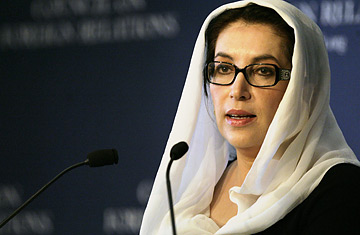
Former Pakistani Prime Minister Benazir Bhutto
Benazir Bhutto has always had a knack for pleasing the crowds. For months the former Pakistani Prime Minister, who has lived in self-imposed exile in London and Dubai since 1999, has hinted at an eventual return to her beloved homeland. She would lead her country to democracy, she promised, but was always coy about when, exactly, she would start. On Friday, in a series of carefully orchestrated simultaneous press conferences held in eight Pakistani cities, Bhutto's Pakistan People’s Party announced the long-awaited date: October 18. Any subsequent information they may have wanted to express was drowned out by the sound of ecstatic cheering and the machine gun rattle of fireworks. In Islamabad the PPP headquarters were decorated as if for a wedding: strings of lights were draped over every surface and rose petals dusted the heads and shoulders of the gathered crowds. Those unable to force their way into the compound stood outside on the street, waving banners and shouting "Long Live Benazir." Earlier, the crowd had erupted into the favored protest chant of the past six months: "Go Musharraf Go," an awkward moment indeed for party leaders currently negotiating a possible power sharing deal with the loathed President General Pervez Musharraf.
The Bhutto press conferences all started precisely at 5:30 p.m., exactly 40 minutes before sundown on the first day of the Muslim fasting month of Ramadan. The good Muslims in her audience hadn’t touched food, drink or cigarettes since dawn. And so, the post press-conference invitation to a traditional sundown feast was met with more cheers than the announcement of her return — proof that she knows what will please a crowd.
Her rallies were significantly better attended than those that materialized for Nawaz Sharif, another former Prime Minister, whose attempted homecoming five days earlier had been aborted at the airport by Musharraf's government. But Sharif's welcoming committee had been heavily repressed by a massive presence of police — one that was, tellingly, nowhere to be seen for Bhutto's celebratory announcement. Nevertheless, the media outnumbered party faithful in both events. There are many political uncertainties to come in the next few weeks — the announcement of presidential elections, Supreme Court rulings on Musharraf’s ability to run for another term while maintaining the office of Army Chief, and a contempt of court case against the government for preventing Sharif’s return among them — but whatever happens, the events will be exhaustively covered by a brand-new press corps, an unpredictable new factor in Pakistani political life that neither Sharif nor Bhutto ever faced.
One of the hallmarks of Musharraf’s reign has been the wholesale liberation of Pakistan’s electronic media. Over the past five years media deregulation has meant that dozens of independent TV stations have exploded on the scene, ready and all too willing to exploit the slightest misdemeanor of those in power. Musharraf has already felt the bite of this newly unleashed press: Exhaustive coverage of his attempts to dismiss a popular Supreme Court justice contributed significantly to his plunge in popularity.
With Sharif safely re-exiled in Saudi Arabia, and a deal with Musharraf still percolating, Bhutto may think the way is cleared for a triumphant return to the premiership. But Pakistan is a different country from the one she fled eight years ago, and many have turned against the one-time democracy campaigner for sleeping with the enemy, Musharraf. Widespread accusations of corruption colored her last term in power, and husband Asif Zardari still carries the nickname "Mr. Ten Percent." An exchange of PPP support for Musharraf’s reelection as President by parliament has been conditional on the dropping of longstanding corruption charges against Bhutto and her family, but Pakistanis grumble that the law should be applied equally, no matter the status of those charged. These are all issues the media is sure to pounce upon the moment she arrives.
